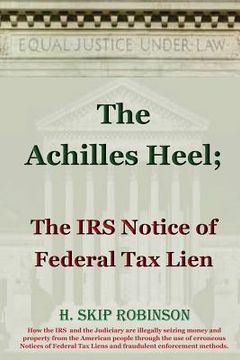Reseña del libro "The Achilles Heel: The IRS Notice Of Federal Tax Lien (en Inglés)"
FYI: Because of the required exhibits needed to prove my assertions, an audiobook just isn't a suitable presentation. In my book, I provide the material and circumstantial evidence, discovered several years ago by pure accident, that caused the hair on my arms to stand up. I've long been an opponent of the tax on individual labor, erroneously called the individual income tax, believing it is oppressive, especially on the civilian population. I can see why bureaucrats and government contractors like it, but for the average person who now only makes $31,000 annually (in 2023 USDs), no wonder so many people are living at or near the poverty line, and 43% of the population can't come up with $400, without having to borrow it. What if I can provide the evidence, that the Notice of Federal Tax Lien, (NFTL) and the underlying Tax Liens, being issued by the IRS Department of the Treasury, are legally insufficient and thus invalid as enforceable liens? The reasons, I believe, why they don't perfect the liens are interesting and the various stories in the book need to be read to appreciate them. The evidence, IMHO, is so obvious that even when I present it to high schoolers, the looks they give me, are of astonishment. If you have ever studied the history of income tax law, it is likely one of the most legally contested issues in American history. Even though I don't think a direct tax on an individual's labor is constitutional, that issue becomes moot, because of the evidence I provide. Since the County or Parish recording of the NFTL starts the actual collection process, this is why I believe it is their Achilles Heel. Since the NFTLs appear to be legally insufficient as valid Liens, the IRS should not be able to collect any money or take people's property from them, if they haven't paid their "alleged" Federal Individual Income Tax. The law is clear from Statutes, case law, Treasury Regulations, the Internal Revenue Code, and the IRS Manual itself. The liens do not meet the necessary legal criterion to be valid. For the NFTLs to be collectible, it must note the specific Federal Statute on them; the "tax liability giving rise to the lien" as the Statutes say and case law supports. It is also self-evident that for any tax lien to be valid, the law(s) should be noted on the liens, so the individual(s) being assessed will know what law(s) they are being asked to obey. When we made several Freedom of Information Act (FOIA) requests to determine the Kind of Tax being assessed and levied, the IRS just ignored them. To create a tax liability at the Federal level, there must be a Congressional Act, and that Act or its related Statute must be noted on the NFTL and its underlying Federal Tax Lien. The NFTL must note the "tax liability giving rise to the lien" and only a Congressional Act and Statute, passed by the legislature, as a public law and signed by the President, can legally create a tax liability. None of the NFTLs researched have anything of that nature on them. What we do know is that when requested using six (6) different methods, including a very important lawsuit, no government representative, would ever give us the "Positive Law" Congressional Act and Statute and/or when it was passed. Try it for yourself; call, write, or do a Freedom of Information Act request under FOIA and see what response you get. To give you an idea of what response you will get, The Supreme Court of the United States refused to hear the case. We The People v. United States 485 F 3D 140 (2007). I was one of the named plaintiffs in this suit, in an attempt to get the IRS Department of the Treasury, to answer 62 questions relating to the Federal Individual Income Tax presented in a formal Petition for Redress of Grievances, a 1st Amendment right. The Federal Courts opinned, the Government did not have to answer our questions. Isn't a democratic republic based on representation? Who are the Repre

